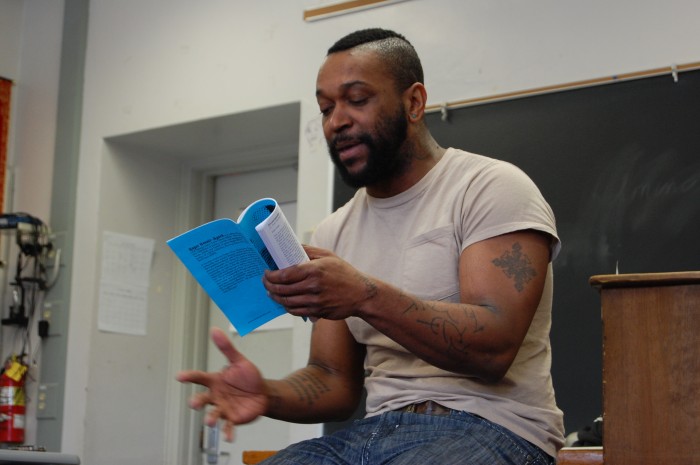 |
| Roger Bonair-Agard [thecommunicator online] |
from Roger Bonair-Agard's Bury My Clothes:
In 2010, an entirely black penguin was discovered in Antarctica.
The genetic possibility of an all-black or all-white penguin is only
miniscule. The following is taken verbatim from a Reuters news
report covering the discovery:
"An all-black penguin has been discovered in Antartica. It seems
to be
assimilating nicely and has even found itself a black & white mate . . .
Recently discovered all-black penguin seems unafraid to defy
convention. . . .
Biologists say that the animal has lost control of its pigmentation.
Other than [that] the animal appears to be perfectly healthy. 'Look
at the size of those legs,' said one scientist. 'It's an absolute monster.'"
The all-back penguin speaks
17 facts you did not know about me
1. I was born here, raised here, met my mate and warmed my
eggs — here.
2. Fully ten seasons passed before you noticed me. Don't make up
theories now,
Johnny-come-lately.
3. Penguins are color blind.
4. Fuck your bell curve, motherfucker — I know that's not a
fact. It's an imperative.
5. Penguins deliberately don't read so we wouldn't have to learn
words like assimilate, like discriminate, like mutate.
6. We pray every day. It's a simple chant:
Evolve, Evolve, Evolve
7. Can't you see it's getting warmer? Don't you see the ice melting?
8. I know the word rhetorical, bitch
9. I'm actually the same size as all the other penguins.
10. You suffer from ocular negrophobia, the condition in which all
black (all-black?) things look really large and scary. Yes, I
know that's a fact about you, motherfucker.
11. I hate you.
12. I don't believe in the same God as you.
13. Evolve, Evolve, Evolve
14. There are two other all-blacks. We do not know each other.
15. I'm prettier than you.
16. I'm making up a song about you. It's called "Albino Mother-
fucker."
17. We have a few all-white penguins here. We're cool. They hate
you too.
In the year of the cutlass
The cocoa hung low and golden
in the cool dark of the Tamana forests.
That year, I was taught
the specific English of the brushing cutlass;
the high arc you made with the long handle
down in front of your left foot, the perpendicular
blade scything the brush into tiny green
tatters of rain with each deft rotation.
In the year of the cutlass, I learned
how to tell if the cocoa was ripe and where
to look for a snake in the branches,
for it was also the year of the mapepire,
the year of the coral and the year I first
noticed the cane being fired. I was taught
the cutlass would go straight through the thickest
cane if you cut down at an angle, in the shaft
on the bias and not at the tree's sweet joints.
I was taught the cutlass was a small spade
for turning the damp brown dirt to throw
seeds in, and then it could become
the year of tomatoes on the vine, the year
of pigeon peas and the year of the chive.
My wrists became cabled and I could
trim the hedge bushes that year. I straightened
the ixoras and the hibiscus
with practiced, precise swings
that launched bits of branch and leaf.
I edged the lawn, needing
neither string to measure a level line
nor shoes to protect my feet.
It was the year of feeling sweat
and feeling my body bristle
like a horse's when the girls passed.
I learned the beautiful song
of the blade when it caught the occasional stone
and sparked shock up my arm. I learned
to aria with the blade's notes then,
how to sing in time,
every swing a metronome.
It was the year of the baritone,
year of the African sanctus and the negro
spiritual. It was the year my grandfather gave me
my own, its handle carved from cedar
with three rivets to hold the hard wood
steady against the steel. I learned
to let the water run the flat side down
the grooves in neat streams.
I learned you could threaten a man
with the cutlass and only beat him
with the flat-side; the year
of the plan-ass and the year I learned
that Choonie called the blade a pooyah
and the peyol from Lopinot sometimes
called it a machet. It was the year
of rum and ole talk. It was the year
of learning to insult your friends
and the year of garlic on the blade
to make the inflicted wound
unhealable. My father left
and my grandfather started telling secrets
about who would come to take the land.
It was the year of practicing
to use the cutlass like a sword. It was the
year of sharpening my body.
It was the year of listening
to the different ways the blade sang;
the year of its tenderness against a fowl's neck
and the year of body against body
in the hot sun — It was the year
of lashing bamboo to make a table,
a small lean-to, a bench. It was the year
people began to die; and my father left
with the sound of a pomerac tree falling.
I learned to keep the cutlass leaned
by the bed, because it was the year
of the bandit and the shape shift,
plant yourself deep to come back
as something new — to learn slowly
how to leave so the cut is quick,
bloodless, barely burning.
No comments:
Post a Comment